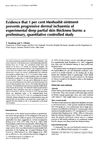 19 citations,
October 2017 in “European Journal of Pharmaceutics and Biopharmaceutics”
19 citations,
October 2017 in “European Journal of Pharmaceutics and Biopharmaceutics” The gel made of minoxidil and hydroxypropyl-β-cyclodextrin improves hair growth and is good for long-term use.
 46 citations,
August 2019 in “Journal of Ethnopharmacology”
46 citations,
August 2019 in “Journal of Ethnopharmacology” Eclipta prostrata has many traditional uses and health benefits, but more research is needed to understand how it works and ensure it's safe.
33 citations,
January 2001 in “Critical care clinics” Dietary lipids affect inflammation and are crucial for normal cell function and immune health.
 May 2019 in “The journal of investigative dermatology/Journal of investigative dermatology”
May 2019 in “The journal of investigative dermatology/Journal of investigative dermatology” Age-related hair loss is linked to the decline and dysfunction of hair follicle stem cells.
 5 citations,
September 2012 in “Springer eBooks”
5 citations,
September 2012 in “Springer eBooks” Nanoparticles can be used to deliver drugs to hair follicles, potentially improving treatments for conditions like acne and alopecia, and could also be used for vaccine delivery and gene therapy.
4 citations,
January 2023 in “Andrology” The testes produce sperm and hormones essential for male development.
 January 2023 in “Journal of Ravishankar University”
January 2023 in “Journal of Ravishankar University” Hair loss can be caused by stress, aging, and harmful substances that create an imbalance in the body's natural processes.
 2 citations,
December 2023 in “Advanced science”
2 citations,
December 2023 in “Advanced science” Glycosaminoglycans help heal wounds but aren't yet ready for clinical use.

Hormones, especially testosterone and DHT, are key for penis development and function, and testosterone therapy may help with erectile dysfunction in those with low levels.
 25 citations,
December 2021 in “Stem Cell Research & Therapy”
25 citations,
December 2021 in “Stem Cell Research & Therapy” MSCs and their exosomes may speed up skin wound healing but need more research for consistent use.
 45 citations,
May 2012 in “The Journal of Steroid Biochemistry and Molecular Biology”
45 citations,
May 2012 in “The Journal of Steroid Biochemistry and Molecular Biology” Too much AKR1C3 enzyme causes resistance to finasteride by increasing testosterone.
 3 citations,
August 2021 in “Clinics in Dermatology”
3 citations,
August 2021 in “Clinics in Dermatology” Minoxidil is the main over-the-counter treatment for hair loss, with other options like finasteride, latanoprost, retinoic acid, antioxidants, biotin, nutraceuticals, and platelet-rich plasma therapy also showing promise.
 September 2013 in “Experimental Dermatology”
September 2013 in “Experimental Dermatology” The document concluded that stem cells are crucial for skin repair, regeneration, and may help in developing advanced skin substitutes.
4 citations,
April 2020 in “Dermatology practical & conceptual” Topical finasteride works faster and better than 17α-estradiol for postmenopausal hair loss.
 38 citations,
June 2017 in “The Journal of Dermatology”
38 citations,
June 2017 in “The Journal of Dermatology” Aging in hair follicle stem cells leads to hair graying, thinning, and loss.
 15 citations,
November 2019 in “Cutaneous and Ocular Toxicology”
15 citations,
November 2019 in “Cutaneous and Ocular Toxicology” Minoxidil tretinoin liposomal based hydrogel shows promise for effective treatment of hair loss by delivering both drugs at the same time.
December 2022 in “Molecular Pharmaceutics” Latanoprost-loaded nanotransfersomes could help treat hair loss by promoting hair growth.
 3 citations,
January 2019 in “Jikken doubutsu ihou/Jikken doubutsu/Experimental animals/Jikken Dobutsu”
3 citations,
January 2019 in “Jikken doubutsu ihou/Jikken doubutsu/Experimental animals/Jikken Dobutsu” Pigs without the Hairless gene showed skin and thymus changes, useful for studying human hair disorders.
 11 citations,
January 2000 in “Journal of Cutaneous Pathology”
11 citations,
January 2000 in “Journal of Cutaneous Pathology” Short telomeres contribute to aging and cancer, and while telomerase can delay aging, it may also promote cancer.
 17 citations,
January 2010 in “International journal of trichology”
17 citations,
January 2010 in “International journal of trichology” A man experienced hair loss from radiotherapy, which can be temporary or permanent depending on radiation dose, with potential treatments available.
 7 citations,
May 2014 in “Clinical practice”
7 citations,
May 2014 in “Clinical practice” Cooling the scalp may prevent hair loss from chemotherapy, hair often grows back after treatment, and nail issues usually improve after stopping the drug.
 119 citations,
January 2012 in “Nutrition & Metabolism”
119 citations,
January 2012 in “Nutrition & Metabolism” Modern lifestyles, including poor diet, stress, and long-term use of certain medications, hinder the body's ability to heal from inflammation, leading to chronic diseases.
11 citations,
August 2021 in “The journal of investigative dermatology/Journal of investigative dermatology” A gene mutation causes early keratinocyte maturation leading to hair loss in Olmsted syndrome.
 December 2011 in “Drug Research”
December 2011 in “Drug Research” The document shows the state of pharmaceutical patents as of 1999, focusing on treatments for various diseases.
 November 2024 in “Skin Health and Disease”
November 2024 in “Skin Health and Disease” Minoxidil is effective for promoting hair growth and has various dermatological uses.
 2 citations,
October 2022 in “International journal of Ayurvedic medicine”
2 citations,
October 2022 in “International journal of Ayurvedic medicine” Licorice has many traditional health benefits, but more research is needed to fully support these claims.
 88 citations,
February 2011 in “Journal of Dermatological Science”
88 citations,
February 2011 in “Journal of Dermatological Science” Minoxidil helps hair growth by activating the β-catenin pathway.
 1 citations,
October 2022 in “Springer eBooks”
1 citations,
October 2022 in “Springer eBooks” Testosterone is key for male sexual function, and treating hormone imbalances can improve sexual issues.
 295 citations,
June 2009 in “Science”
295 citations,
June 2009 in “Science” Stromal stem cells may help heal wounds by becoming structural cells or affecting the immune system, but more research is needed to understand how.

Meshushit ointment helps form thicker healing tissue and preserves hair follicles in burns.
























